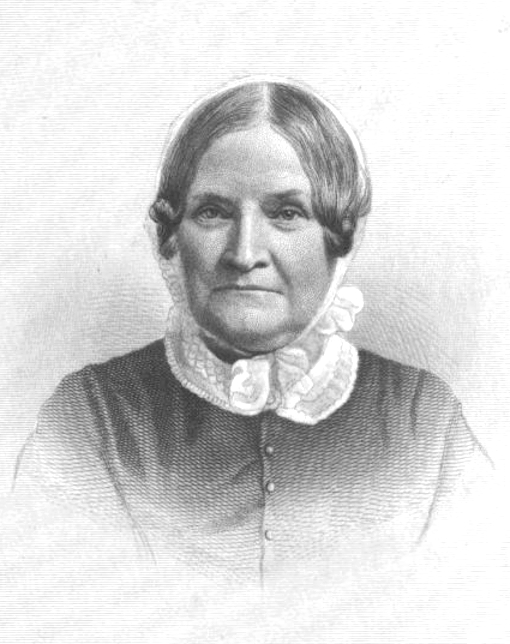Chapter VIII http://utc.iath.virginia.edu/abolitn/abeslmca5t.html
1830s, An Appeal on Behalf of That Class of Americans Called Africans (1833)
Lydia Maria Child: Frasi in inglese
Letters from New York https://play.google.com/store/books/details?id=dcYDAAAAQAAJ&rdid=book-dcYDAAAAQAAJ&rdot=1 (1841-1843), p. 206, Letter XXVIII, 29 Sep 1842
1840s, Letters from New York (1843)
Contesto: The cure for all the ills and wrongs, the cares, the sorrows, and crimes of humanity, all lie in that one word LOVE. It is the divine vitality that produces and restores life. To each and every one of us it gives the power of working miracles, if we will.
Chapter VIII http://utc.iath.virginia.edu/abolitn/abeslmca5t.html
1830s, An Appeal on Behalf of That Class of Americans Called Africans (1833)
Contesto: I do not know how the affair at Canterbury is generally considered; but I have heard individuals of all parties and all opinions speak of it—and never without merriment or indignation. Fifty years hence, the black laws of Connecticut will be a greater source of amusement to the antiquarian, than her famous blue laws.
“I think we have reason to thank God for Abraham Lincoln.”
Letter to George W. Julian (8 April 1865), as quoted in The Fiery Trial: Abraham Lincoln and American Slavery http://books.google.com/books?id=4b8m7cv3wTIC&pg=PA335#v=onepage&q&f=false, by Eric Foner, p. 336
1860s
Contesto: I think we have reason to thank God for Abraham Lincoln. With all his deficiencies, it must be admitted that he has grown continually.
Chapter VI http://utc.iath.virginia.edu/abolitn/abeslmca3t.html
1830s, An Appeal on Behalf of That Class of Americans Called Africans (1833)
1840s, Letters from New York (1843)
Origine: Letters from New York http://www.bartleby.com/66/59/12260.html, vol. 1, letter 34
1840s, Letters from New York (1843)
Origine: Letters from New York http://www.bartleby.com/66/57/12260.html, vol. 1, letter 33
1840s, Letters from New York (1843)
Origine: Letters from New York http://www.bartleby.com/66/63/12263.html, vol. 1, letter 18
1840s, Letters from New York (1843)
Origine: Letters from New York http://www.bartleby.com/66/60/12260.html, vol. 1, letter 34
Letter to the Advocates of Woman’s Suffrage (1870).
1870s
“Childhood itself is scarcely more lovely than a cheerful, kind, sunshiny old age.”
1840s, Letters from New York (1843)
Origine: Letters from New York http://www.bartleby.com/66/66/12266.html, vol. 1, letter 37
1840s, Letters from New York (1843)
Origine: Letters from New York http://www.bartleby.com/66/67/12267.html,vol. 1, letter 38
“Yours for the unshackled exercise of every faculty by every human being.”
Message to woman suffrage supporters (c. 1875)
1870s
“The United States is…a warning rather than an example to the world.”
To the twenty-fifth-anniversary meeting of the Massachusetts Anti-Slavery Society (1857)
1850s
Chapter VI http://utc.iath.virginia.edu/abolitn/abeslmca3t.html
1830s, An Appeal on Behalf of That Class of Americans Called Africans (1833)
1840s, Letters from New York (1843)
Origine: Letters from New York http://www.bartleby.com/66/61/12261.html, vol. 1, letter 34
“It is impossible to exaggerate the evil work theology has done in the world.”
The Progress of Religious Ideas Through Successive Ages http://books.google.ca/books?id=mGmQMdHqj9AC&pg=PA451&dq=It+is+impossible+to+exaggerate+the+evil+work+theology++Lydia+Maria+Child&hl=en&sa=X&ei=At4QUYLKOrOM0QGp34DIBg&redir_esc=y#v=onepage&q=It%20is%20impossible%20to%20exaggerate%20the%20evil%20work%20theology%20%20Lydia%20Maria%20Child&f=false, 1855, p. 451, vol. 3
1850s
1840s, Letters from New York (1843)
Origine: Letters from New York http://www.bartleby.com/66/64/12264.html, vol. 1, letter 39
1860s
Origine: Letter to Harriet Seward http://www.bartleby.com/66/72/12272.html (1869)
Chapter VIII http://utc.iath.virginia.edu/abolitn/abeslmca5t.html
1830s, An Appeal on Behalf of That Class of Americans Called Africans (1833)
1860s
Origine: Letter to John Fraser http://www.bartleby.com/66/71/12271.html (1868)
“I will work in my own way, according to the light that is in me.”
Letter to Ellis Gray Loring (1843).
1840s
“The eye of genius has always a plaintive expression, and its natural language is pathos.”
1840s, Letters from New York (1843)
Origine: Letters from New York http://www.bartleby.com/66/62/12262.html, vol. 1, letter 39
Chapter V http://utc.iath.virginia.edu/abolitn/abeslmca2t.html
1830s, An Appeal on Behalf of That Class of Americans Called Africans (1833)
1840s, Letters from New York (1843)
Origine: Letters from New York http://www.bartleby.com/66/58/12260.html, vol. 1, letter 26
The New England Boy's Song About Thanksgiving Day http://www.potw.org/archive/potw64.html, st. 1, from Flowers for Children (1844-1846).
1840s
"Concerning Women", Independent, 21 Oct 1869, as quoted in "Extracts from 'Concerning Women'" in A Lydia Maria Child Reader (1997), edited by Carolyn L. Karcher, p 403 https://books.google.com/books?id=l1lv2eDR-ocC&pg=PA403&lpg=PA403&dq=%22no+woman+could+expect+to+be+regarded+as+a+lady+after+she+had+written+a+book%22&source=bl&ots=m4wJPHeLvD&sig=tyepgWWYYRTodRbMJwCW5wZOwvs&hl=en&sa=X&ved=0ahUKEwi4jdDQ4ojSAhWKSiYKHZl_AnUQ6AEIKzAD#v=onepage&q=%22no%20woman%20could%20expect%20to%20be%20regarded%20as%20a%20lady%20after%20she%20had%20written%20a%20book%22&f=false.
